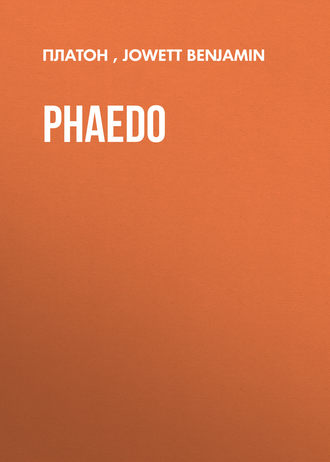
Платон
Phaedo
4. Modern philosophy is perplexed at this whole question, which is sometimes fairly given up and handed over to the realm of faith. The perplexity should not be forgotten by us when we attempt to submit the Phaedo of Plato to the requirements of logic. For what idea can we form of the soul when separated from the body? Or how can the soul be united with the body and still be independent? Is the soul related to the body as the ideal to the real, or as the whole to the parts, or as the subject to the object, or as the cause to the effect, or as the end to the means? Shall we say with Aristotle, that the soul is the entelechy or form of an organized living body? or with Plato, that she has a life of her own? Is the Pythagorean image of the harmony, or that of the monad, the truer expression? Is the soul related to the body as sight to the eye, or as the boatman to his boat? (Arist. de Anim.) And in another state of being is the soul to be conceived of as vanishing into infinity, hardly possessing an existence which she can call her own, as in the pantheistic system of Spinoza: or as an individual informing another body and entering into new relations, but retaining her own character? (Compare Gorgias.) Or is the opposition of soul and body a mere illusion, and the true self neither soul nor body, but the union of the two in the 'I' which is above them? And is death the assertion of this individuality in the higher nature, and the falling away into nothingness of the lower? Or are we vainly attempting to pass the boundaries of human thought? The body and the soul seem to be inseparable, not only in fact, but in our conceptions of them; and any philosophy which too closely unites them, or too widely separates them, either in this life or in another, disturbs the balance of human nature. No thinker has perfectly adjusted them, or been entirely consistent with himself in describing their relation to one another. Nor can we wonder that Plato in the infancy of human thought should have confused mythology and philosophy, or have mistaken verbal arguments for real ones.
5. Again, believing in the immortality of the soul, we must still ask the question of Socrates, 'What is that which we suppose to be immortal?' Is it the personal and individual element in us, or the spiritual and universal? Is it the principle of knowledge or of goodness, or the union of the two? Is it the mere force of life which is determined to be, or the consciousness of self which cannot be got rid of, or the fire of genius which refuses to be extinguished? Or is there a hidden being which is allied to the Author of all existence, who is because he is perfect, and to whom our ideas of perfection give us a title to belong? Whatever answer is given by us to these questions, there still remains the necessity of allowing the permanence of evil, if not for ever, at any rate for a time, in order that the wicked 'may not have too good a bargain.' For the annihilation of evil at death, or the eternal duration of it, seem to involve equal difficulties in the moral government of the universe. Sometimes we are led by our feelings, rather than by our reason, to think of the good and wise only as existing in another life. Why should the mean, the weak, the idiot, the infant, the herd of men who have never in any proper sense the use of reason, reappear with blinking eyes in the light of another world? But our second thought is that the hope of humanity is a common one, and that all or none will be partakers of immortality. Reason does not allow us to suppose that we have any greater claims than others, and experience may often reveal to us unexpected flashes of the higher nature in those whom we had despised. Why should the wicked suffer any more than ourselves? had we been placed in their circumstances should we have been any better than they? The worst of men are objects of pity rather than of anger to the philanthropist; must they not be equally such to divine benevolence? Even more than the good they have need of another life; not that they may be punished, but that they may be educated. These are a few of the reflections which arise in our minds when we attempt to assign any form to our conceptions of a future state.
There are some other questions which are disturbing to us because we have no answer to them. What is to become of the animals in a future state? Have we not seen dogs more faithful and intelligent than men, and men who are more stupid and brutal than any animals? Does their life cease at death, or is there some 'better thing reserved' also for them? They may be said to have a shadow or imitation of morality, and imperfect moral claims upon the benevolence of man and upon the justice of God. We cannot think of the least or lowest of them, the insect, the bird, the inhabitants of the sea or the desert, as having any place in a future world, and if not all, why should those who are specially attached to man be deemed worthy of any exceptional privilege? When we reason about such a subject, almost at once we degenerate into nonsense. It is a passing thought which has no real hold on the mind. We may argue for the existence of animals in a future state from the attributes of God, or from texts of Scripture ('Are not two sparrows sold for one farthing?' etc.), but the truth is that we are only filling up the void of another world with our own fancies. Again, we often talk about the origin of evil, that great bugbear of theologians, by which they frighten us into believing any superstition. What answer can be made to the old commonplace, 'Is not God the author of evil, if he knowingly permitted, but could have prevented it?' Even if we assume that the inequalities of this life are rectified by some transposition of human beings in another, still the existence of the very least evil if it could have been avoided, seems to be at variance with the love and justice of God. And so we arrive at the conclusion that we are carrying logic too far, and that the attempt to frame the world according to a rule of divine perfection is opposed to experience and had better be given up. The case of the animals is our own. We must admit that the Divine Being, although perfect himself, has placed us in a state of life in which we may work together with him for good, but we are very far from having attained to it.
6. Again, ideas must be given through something; and we are always prone to argue about the soul from analogies of outward things which may serve to embody our thoughts, but are also partly delusive. For we cannot reason from the natural to the spiritual, or from the outward to the inward. The progress of physiological science, without bringing us nearer to the great secret, has tended to remove some erroneous notions respecting the relations of body and mind, and in this we have the advantage of the ancients. But no one imagines that any seed of immortality is to be discerned in our mortal frames. Most people have been content to rest their belief in another life on the agreement of the more enlightened part of mankind, and on the inseparable connection of such a doctrine with the existence of a God – also in a less degree on the impossibility of doubting about the continued existence of those whom we love and reverence in this world. And after all has been said, the figure, the analogy, the argument, are felt to be only approximations in different forms to an expression of the common sentiment of the human heart. That we shall live again is far more certain than that we shall take any particular form of life.
7. When we speak of the immortality of the soul, we must ask further what we mean by the word immortality. For of the duration of a living being in countless ages we can form no conception; far less than a three years' old child of the whole of life. The naked eye might as well try to see the furthest star in the infinity of heaven. Whether time and space really exist when we take away the limits of them may be doubted; at any rate the thought of them when unlimited us so overwhelming to us as to lose all distinctness. Philosophers have spoken of them as forms of the human mind, but what is the mind without them? As then infinite time, or an existence out of time, which are the only possible explanations of eternal duration, are equally inconceivable to us, let us substitute for them a hundred or a thousand years after death, and ask not what will be our employment in eternity, but what will happen to us in that definite portion of time; or what is now happening to those who passed out of life a hundred or a thousand years ago. Do we imagine that the wicked are suffering torments, or that the good are singing the praises of God, during a period longer than that of a whole life, or of ten lives of men? Is the suffering physical or mental? And does the worship of God consist only of praise, or of many forms of service? Who are the wicked, and who are the good, whom we venture to divide by a hard and fast line; and in which of the two classes should we place ourselves and our friends? May we not suspect that we are making differences of kind, because we are unable to imagine differences of degree? – putting the whole human race into heaven or hell for the greater convenience of logical division? Are we not at the same time describing them both in superlatives, only that we may satisfy the demands of rhetoric? What is that pain which does not become deadened after a thousand years? or what is the nature of that pleasure or happiness which never wearies by monotony? Earthly pleasures and pains are short in proportion as they are keen; of any others which are both intense and lasting we have no experience, and can form no idea. The words or figures of speech which we use are not consistent with themselves. For are we not imagining Heaven under the similitude of a church, and Hell as a prison, or perhaps a madhouse or chamber of horrors? And yet to beings constituted as we are, the monotony of singing psalms would be as great an infliction as the pains of hell, and might be even pleasantly interrupted by them. Where are the actions worthy of rewards greater than those which are conferred on the greatest benefactors of mankind? And where are the crimes which according to Plato's merciful reckoning, – more merciful, at any rate, than the eternal damnation of so-called Christian teachers, – for every ten years in this life deserve a hundred of punishment in the life to come? We should be ready to die of pity if we could see the least of the sufferings which the writers of Infernos and Purgatorios have attributed to the damned. Yet these joys and terrors seem hardly to exercise an appreciable influence over the lives of men. The wicked man when old, is not, as Plato supposes (Republic), more agitated by the terrors of another world when he is nearer to them, nor the good in an ecstasy at the joys of which he is soon to be the partaker. Age numbs the sense of both worlds; and the habit of life is strongest in death. Even the dying mother is dreaming of her lost children as they were forty or fifty years before, 'pattering over the boards,' not of reunion with them in another state of being. Most persons when the last hour comes are resigned to the order of nature and the will of God. They are not thinking of Dante's Inferno or Paradiso, or of the Pilgrim's Progress. Heaven and hell are not realities to them, but words or ideas; the outward symbols of some great mystery, they hardly know what. Many noble poems and pictures have been suggested by the traditional representations of them, which have been fixed in forms of art and can no longer be altered. Many sermons have been filled with descriptions of celestial or infernal mansions. But hardly even in childhood did the thought of heaven and hell supply the motives of our actions, or at any time seriously affect the substance of our belief.
8. Another life must be described, if at all, in forms of thought and not of sense. To draw pictures of heaven and hell, whether in the language of Scripture or any other, adds nothing to our real knowledge, but may perhaps disguise our ignorance. The truest conception which we can form of a future life is a state of progress or education – a progress from evil to good, from ignorance to knowledge. To this we are led by the analogy of the present life, in which we see different races and nations of men, and different men and women of the same nation, in various states or stages of cultivation; some more and some less developed, and all of them capable of improvement under favourable circumstances. There are punishments too of children when they are growing up inflicted by their parents, of elder offenders which are imposed by the law of the land, of all men at all times of life, which are attached by the laws of nature to the performance of certain actions. All these punishments are really educational; that is to say, they are not intended to retaliate on the offender, but to teach him a lesson. Also there is an element of chance in them, which is another name for our ignorance of the laws of nature. There is evil too inseparable from good (compare Lysis); not always punished here, as good is not always rewarded. It is capable of being indefinitely diminished; and as knowledge increases, the element of chance may more and more disappear.
For we do not argue merely from the analogy of the present state of this world to another, but from the analogy of a probable future to which we are tending. The greatest changes of which we have had experience as yet are due to our increasing knowledge of history and of nature. They have been produced by a few minds appearing in three or four favoured nations, in a comparatively short period of time. May we be allowed to imagine the minds of men everywhere working together during many ages for the completion of our knowledge? May not the science of physiology transform the world? Again, the majority of mankind have really experienced some moral improvement; almost every one feels that he has tendencies to good, and is capable of becoming better. And these germs of good are often found to be developed by new circumstances, like stunted trees when transplanted to a better soil. The differences between the savage and the civilized man, or between the civilized man in old and new countries, may be indefinitely increased. The first difference is the effect of a few thousand, the second of a few hundred years. We congratulate ourselves that slavery has become industry; that law and constitutional government have superseded despotism and violence; that an ethical religion has taken the place of Fetichism. There may yet come a time when the many may be as well off as the few; when no one will be weighed down by excessive toil; when the necessity of providing for the body will not interfere with mental improvement; when the physical frame may be strengthened and developed; and the religion of all men may become a reasonable service.
Nothing therefore, either in the present state of man or in the tendencies of the future, as far as we can entertain conjecture of them, would lead us to suppose that God governs us vindictively in this world, and therefore we have no reason to infer that he will govern us vindictively in another. The true argument from analogy is not, 'This life is a mixed state of justice and injustice, of great waste, of sudden casualties, of disproportionate punishments, and therefore the like inconsistencies, irregularities, injustices are to be expected in another;' but 'This life is subject to law, and is in a state of progress, and therefore law and progress may be believed to be the governing principles of another.' All the analogies of this world would be against unmeaning punishments inflicted a hundred or a thousand years after an offence had been committed. Suffering there might be as a part of education, but not hopeless or protracted; as there might be a retrogression of individuals or of bodies of men, yet not such as to interfere with a plan for the improvement of the whole (compare Laws.)
9. But some one will say: That we cannot reason from the seen to the unseen, and that we are creating another world after the image of this, just as men in former ages have created gods in their own likeness. And we, like the companions of Socrates, may feel discouraged at hearing our favourite 'argument from analogy' thus summarily disposed of. Like himself, too, we may adduce other arguments in which he seems to have anticipated us, though he expresses them in different language. For we feel that the soul partakes of the ideal and invisible; and can never fall into the error of confusing the external circumstances of man with his higher self; or his origin with his nature. It is as repugnant to us as it was to him to imagine that our moral ideas are to be attributed only to cerebral forces. The value of a human soul, like the value of a man's life to himself, is inestimable, and cannot be reckoned in earthly or material things. The human being alone has the consciousness of truth and justice and love, which is the consciousness of God. And the soul becoming more conscious of these, becomes more conscious of her own immortality.
10. The last ground of our belief in immortality, and the strongest, is the perfection of the divine nature. The mere fact of the existence of God does not tend to show the continued existence of man. An evil God or an indifferent God might have had the power, but not the will, to preserve us. He might have regarded us as fitted to minister to his service by a succession of existences, – like the animals, without attributing to each soul an incomparable value. But if he is perfect, he must will that all rational beings should partake of that perfection which he himself is. In the words of the Timaeus, he is good, and therefore he desires that all other things should be as like himself as possible. And the manner in which he accomplishes this is by permitting evil, or rather degrees of good, which are otherwise called evil. For all progress is good relatively to the past, and yet may be comparatively evil when regarded in the light of the future. Good and evil are relative terms, and degrees of evil are merely the negative aspect of degrees of good. Of the absolute goodness of any finite nature we can form no conception; we are all of us in process of transition from one degree of good or evil to another. The difficulties which are urged about the origin or existence of evil are mere dialectical puzzles, standing in the same relation to Christian philosophy as the puzzles of the Cynics and Megarians to the philosophy of Plato. They arise out of the tendency of the human mind to regard good and evil both as relative and absolute; just as the riddles about motion are to be explained by the double conception of space or matter, which the human mind has the power of regarding either as continuous or discrete.
In speaking of divine perfection, we mean to say that God is just and true and loving, the author of order and not of disorder, of good and not of evil. Or rather, that he is justice, that he is truth, that he is love, that he is order, that he is the very progress of which we were speaking; and that wherever these qualities are present, whether in the human soul or in the order of nature, there is God. We might still see him everywhere, if we had not been mistakenly seeking for him apart from us, instead of in us; away from the laws of nature, instead of in them. And we become united to him not by mystical absorption, but by partaking, whether consciously or unconsciously, of that truth and justice and love which he himself is.
Thus the belief in the immortality of the soul rests at last on the belief in God. If there is a good and wise God, then there is a progress of mankind towards perfection; and if there is no progress of men towards perfection, then there is no good and wise God. We cannot suppose that the moral government of God of which we see the beginnings in the world and in ourselves will cease when we pass out of life.
11. Considering the 'feebleness of the human faculties and the uncertainty of the subject,' we are inclined to believe that the fewer our words the better. At the approach of death there is not much said; good men are too honest to go out of the world professing more than they know. There is perhaps no important subject about which, at any time, even religious people speak so little to one another. In the fulness of life the thought of death is mostly awakened by the sight or recollection of the death of others rather than by the prospect of our own. We must also acknowledge that there are degrees of the belief in immortality, and many forms in which it presents itself to the mind. Some persons will say no more than that they trust in God, and that they leave all to Him. It is a great part of true religion not to pretend to know more than we do. Others when they quit this world are comforted with the hope 'That they will see and know their friends in heaven.' But it is better to leave them in the hands of God and to be assured that 'no evil shall touch them.' There are others again to whom the belief in a divine personality has ceased to have any longer a meaning; yet they are satisfied that the end of all is not here, but that something still remains to us, 'and some better thing for the good than for the evil.' They are persuaded, in spite of their theological nihilism, that the ideas of justice and truth and holiness and love are realities. They cherish an enthusiastic devotion to the first principles of morality. Through these they see, or seem to see, darkly, and in a figure, that the soul is immortal.
But besides differences of theological opinion which must ever prevail about things unseen, the hope of immortality is weaker or stronger in men at one time of life than at another; it even varies from day to day. It comes and goes; the mind, like the sky, is apt to be overclouded. Other generations of men may have sometimes lived under an 'eclipse of faith,' to us the total disappearance of it might be compared to the 'sun falling from heaven.' And we may sometimes have to begin again and acquire the belief for ourselves; or to win it back again when it is lost. It is really weakest in the hour of death. For Nature, like a kind mother or nurse, lays us to sleep without frightening us; physicians, who are the witnesses of such scenes, say that under ordinary circumstances there is no fear of the future. Often, as Plato tells us, death is accompanied 'with pleasure.' (Tim.) When the end is still uncertain, the cry of many a one has been, 'Pray, that I may be taken.' The last thoughts even of the best men depend chiefly on the accidents of their bodily state. Pain soon overpowers the desire of life; old age, like the child, is laid to sleep almost in a moment. The long experience of life will often destroy the interest which mankind have in it. So various are the feelings with which different persons draw near to death; and still more various the forms in which imagination clothes it. For this alternation of feeling compare the Old Testament, – Psalm vi.; Isaiah; Eccles.
12. When we think of God and of man in his relation to God; of the imperfection of our present state and yet of the progress which is observable in the history of the world and of the human mind; of the depth and power of our moral ideas which seem to partake of the very nature of God Himself; when we consider the contrast between the physical laws to which we are subject and the higher law which raises us above them and is yet a part of them; when we reflect on our capacity of becoming the 'spectators of all time and all existence,' and of framing in our own minds the ideal of a perfect Being; when we see how the human mind in all the higher religions of the world, including Buddhism, notwithstanding some aberrations, has tended towards such a belief – we have reason to think that our destiny is different from that of animals; and though we cannot altogether shut out the childish fear that the soul upon leaving the body may 'vanish into thin air,' we have still, so far as the nature of the subject admits, a hope of immortality with which we comfort ourselves on sufficient grounds. The denial of the belief takes the heart out of human life; it lowers men to the level of the material. As Goethe also says, 'He is dead even in this world who has no belief in another.'
13. It is well also that we should sometimes think of the forms of thought under which the idea of immortality is most naturally presented to us. It is clear that to our minds the risen soul can no longer be described, as in a picture, by the symbol of a creature half-bird, half-human, nor in any other form of sense. The multitude of angels, as in Milton, singing the Almighty's praises, are a noble image, and may furnish a theme for the poet or the painter, but they are no longer an adequate expression of the kingdom of God which is within us. Neither is there any mansion, in this world or another, in which the departed can be imagined to dwell and carry on their occupations. When this earthly tabernacle is dissolved, no other habitation or building can take them in: it is in the language of ideas only that we speak of them.
First of all there is the thought of rest and freedom from pain; they have gone home, as the common saying is, and the cares of this world touch them no more. Secondly, we may imagine them as they were at their best and brightest, humbly fulfilling their daily round of duties – selfless, childlike, unaffected by the world; when the eye was single and the whole body seemed to be full of light; when the mind was clear and saw into the purposes of God. Thirdly, we may think of them as possessed by a great love of God and man, working out His will at a further stage in the heavenly pilgrimage. And yet we acknowledge that these are the things which eye hath not seen nor ear heard and therefore it hath not entered into the heart of man in any sensible manner to conceive them. Fourthly, there may have been some moments in our own lives when we have risen above ourselves, or been conscious of our truer selves, in which the will of God has superseded our wills, and we have entered into communion with Him, and been partakers for a brief season of the Divine truth and love, in which like Christ we have been inspired to utter the prayer, 'I in them, and thou in me, that we may be all made perfect in one.' These precious moments, if we have ever known them, are the nearest approach which we can make to the idea of immortality.
14. Returning now to the earlier stage of human thought which is represented by the writings of Plato, we find that many of the same questions have already arisen: there is the same tendency to materialism; the same inconsistency in the application of the idea of mind; the same doubt whether the soul is to be regarded as a cause or as an effect; the same falling back on moral convictions. In the Phaedo the soul is conscious of her divine nature, and the separation from the body which has been commenced in this life is perfected in another. Beginning in mystery, Socrates, in the intermediate part of the Dialogue, attempts to bring the doctrine of a future life into connection with his theory of knowledge. In proportion as he succeeds in this, the individual seems to disappear in a more general notion of the soul; the contemplation of ideas 'under the form of eternity' takes the place of past and future states of existence. His language may be compared to that of some modern philosophers, who speak of eternity, not in the sense of perpetual duration of time, but as an ever-present quality of the soul. Yet at the conclusion of the Dialogue, having 'arrived at the end of the intellectual world' (Republic), he replaces the veil of mythology, and describes the soul and her attendant genius in the language of the mysteries or of a disciple of Zoroaster. Nor can we fairly demand of Plato a consistency which is wanting among ourselves, who acknowledge that another world is beyond the range of human thought, and yet are always seeking to represent the mansions of heaven or hell in the colours of the painter, or in the descriptions of the poet or rhetorician.
15. The doctrine of the immortality of the soul was not new to the Greeks in the age of Socrates, but, like the unity of God, had a foundation in the popular belief. The old Homeric notion of a gibbering ghost flitting away to Hades; or of a few illustrious heroes enjoying the isles of the blest; or of an existence divided between the two; or the Hesiodic, of righteous spirits, who become guardian angels, – had given place in the mysteries and the Orphic poets to representations, partly fanciful, of a future state of rewards and punishments. (Laws.) The reticence of the Greeks on public occasions and in some part of their literature respecting this 'underground' religion, is not to be taken as a measure of the diffusion of such beliefs. If Pericles in the funeral oration is silent on the consolations of immortality, the poet Pindar and the tragedians on the other hand constantly assume the continued existence of the dead in an upper or under world. Darius and Laius are still alive; Antigone will be dear to her brethren after death; the way to the palace of Cronos is found by those who 'have thrice departed from evil.' The tragedy of the Greeks is not 'rounded' by this life, but is deeply set in decrees of fate and mysterious workings of powers beneath the earth. In the caricature of Aristophanes there is also a witness to the common sentiment. The Ionian and Pythagorean philosophies arose, and some new elements were added to the popular belief. The individual must find an expression as well as the world. Either the soul was supposed to exist in the form of a magnet, or of a particle of fire, or of light, or air, or water; or of a number or of a harmony of number; or to be or have, like the stars, a principle of motion (Arist. de Anim.). At length Anaxagoras, hardly distinguishing between life and mind, or between mind human and divine, attained the pure abstraction; and this, like the other abstractions of Greek philosophy, sank deep into the human intelligence. The opposition of the intelligible and the sensible, and of God to the world, supplied an analogy which assisted in the separation of soul and body. If ideas were separable from phenomena, mind was also separable from matter; if the ideas were eternal, the mind that conceived them was eternal too. As the unity of God was more distinctly acknowledged, the conception of the human soul became more developed. The succession, or alternation of life and death, had occurred to Heracleitus. The Eleatic Parmenides had stumbled upon the modern thesis, that 'thought and being are the same.' The Eastern belief in transmigration defined the sense of individuality; and some, like Empedocles, fancied that the blood which they had shed in another state of being was crying against them, and that for thirty thousand years they were to be 'fugitives and vagabonds upon the earth.' The desire of recognizing a lost mother or love or friend in the world below (Phaedo) was a natural feeling which, in that age as well as in every other, has given distinctness to the hope of immortality. Nor were ethical considerations wanting, partly derived from the necessity of punishing the greater sort of criminals, whom no avenging power of this world could reach. The voice of conscience, too, was heard reminding the good man that he was not altogether innocent. (Republic.) To these indistinct longings and fears an expression was given in the mysteries and Orphic poets: a 'heap of books' (Republic), passing under the names of Musaeus and Orpheus in Plato's time, were filled with notions of an under-world.







